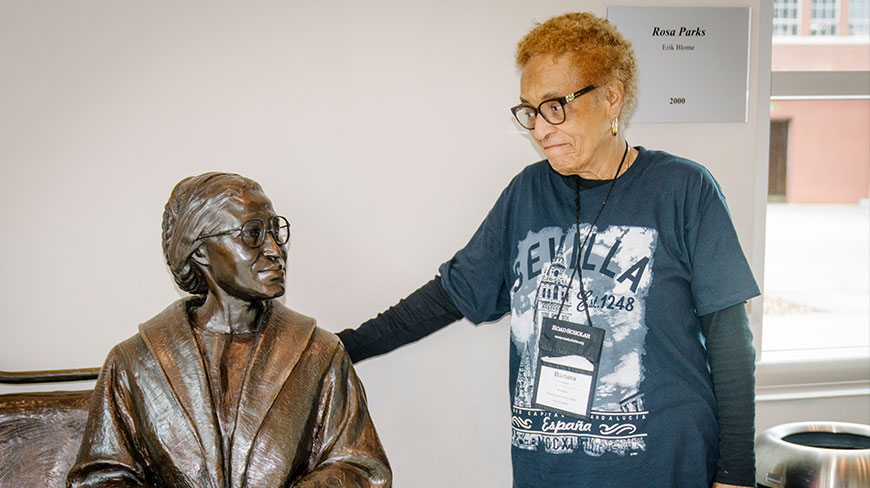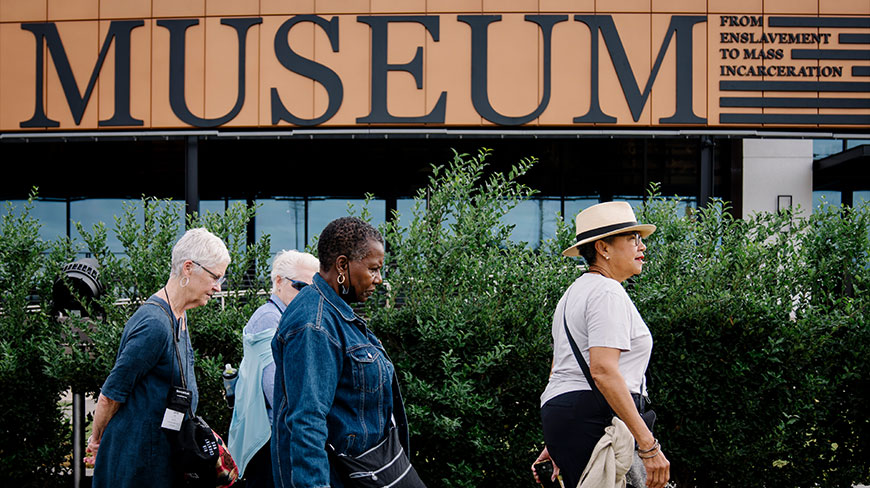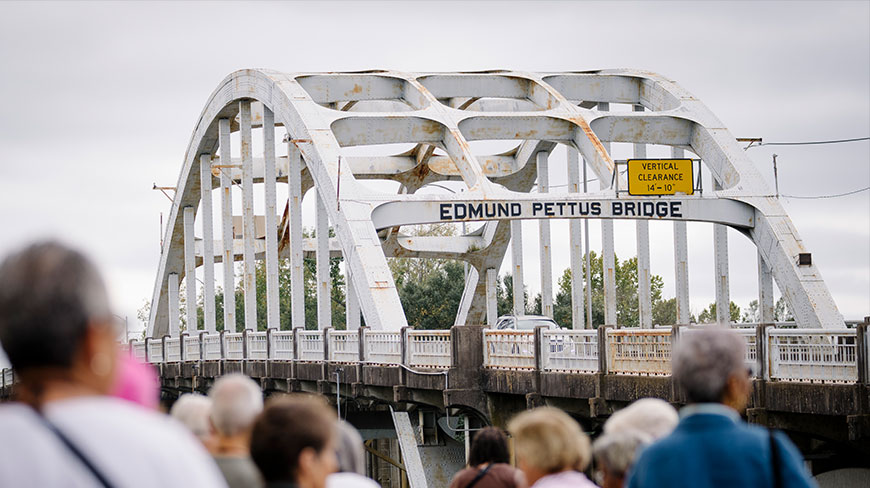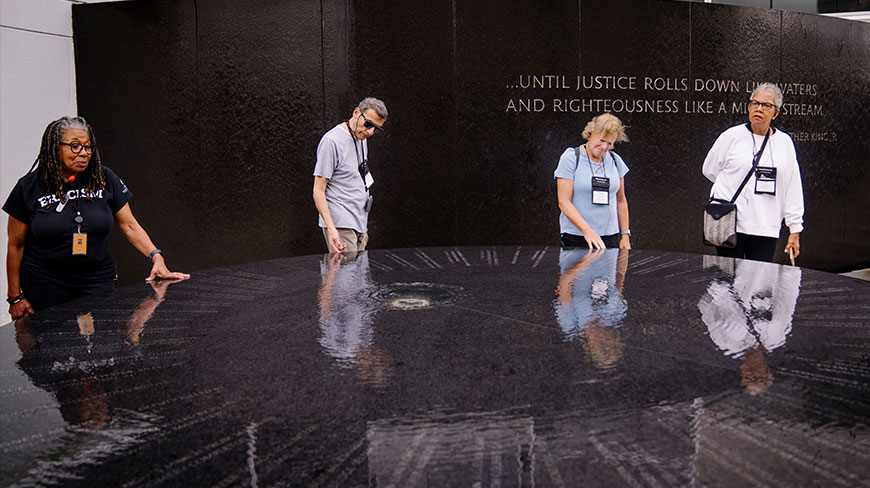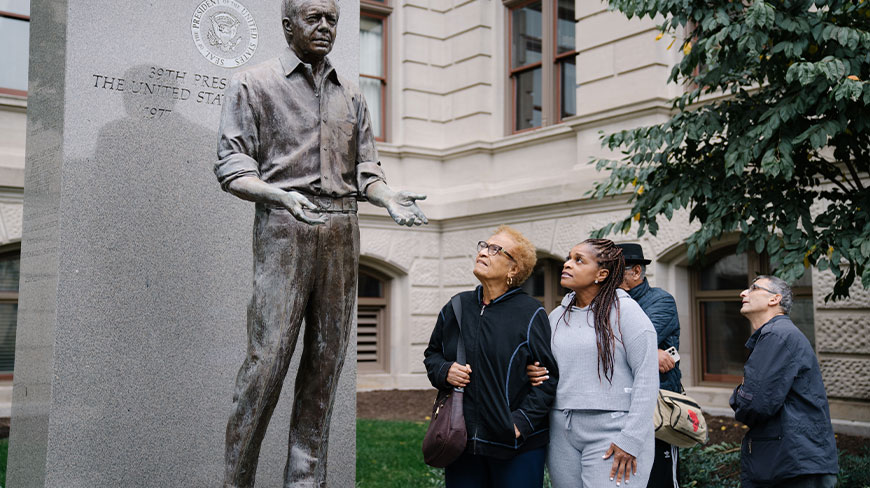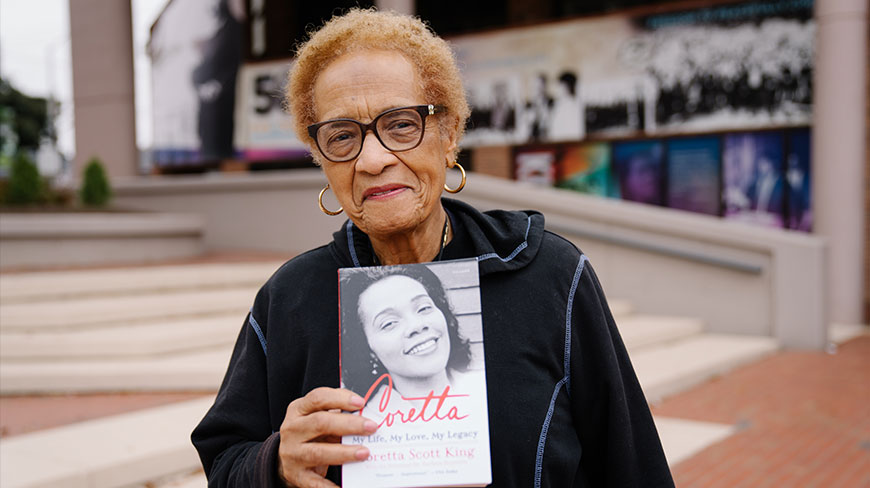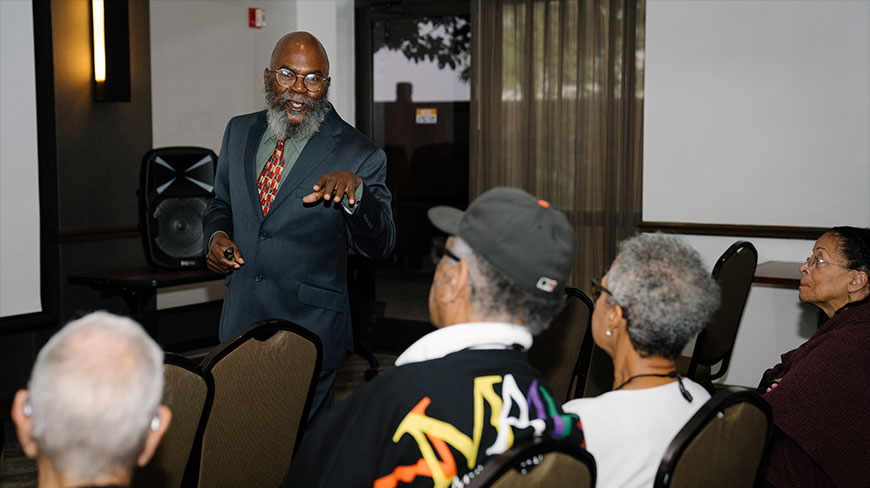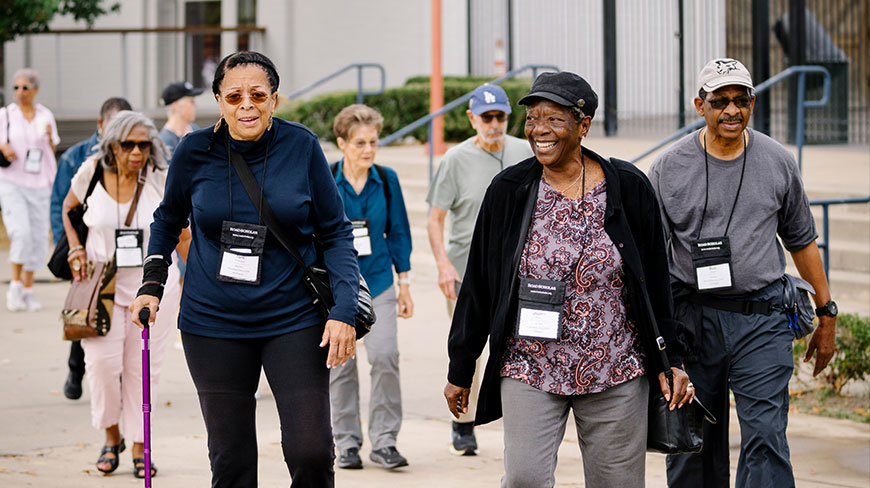Georgia/Alabama
The Civil Rights Movement: Atlanta, Montgomery, Selma, Birmingham
Program No. 22657RJ
Journey through the Deep South to learn the history of the Civil Rights Movement and its defining clashes. Hear powerful stories of struggle and be inspired by resilient heroes.
Itinerary
While we make every effort to ensure the accuracy of our published materials, programs are typically advertised more than a year prior to their start date.
Read More.
While we make every effort to ensure the accuracy of our published materials, programs are typically advertised more than a year prior to their start date. As a result, some program activities, schedules, accommodations, personnel, and other logistics occasionally change due to local conditions or circumstances. Should a major change occur, we will make every effort to alert you. For less significant changes, we will update you during orientation. Thank you for your understanding.
Duration
8 days
7 nights
What's Included
17 meals (
7B, 5L, 5D
)
4 expert-led lectures
12 expert-led field trips
1 performance
An experienced Group Leader
7 nights of accommodations
Taxes and customary gratuity
Road Scholar Assurance Plan
Day
1
Check-in, Orientation, Welcome Dinner
Location:
Atlanta, Georgia
Meals:
D
Stay:
Hyatt Place Buckhead Atlanta
Activity Note
Hotel check-in from 4:00 p.m. Remember to bring your nametag (sent previously). Walking 1 block to dinner.
Afternoon:
Program Registration: 5:00 p.m. After you check in and have your room assignment, join us the Road Scholar table in the conference room to meet with program staff, get any updated information, and confirm the time and location of the Orientation session. If you arrive late, please locate your Group Leader and let them know you have arrived. Orientation. The Group Leader will greet everyone and lead introductions. We will review the up-to-date program schedule, discuss roles and responsibilities, logistics, safety guidelines, emergency procedures, and answer questions. We will learn from the Group Leader as well as local experts who will give lectures and lead field trips. Program-related travel and transfers will be via private motorcoach unless noted otherwise. Periods in the schedule designated as “Free time” and “At leisure” offer opportunities to do what you like and make your experience even more meaningful and memorable according to your personal preferences. The Group Leader will be happy to offer suggestions. Program activities, schedules, personnel, and indicated distances or times may change due to local circumstances/conditions. In the event of changes, we will alert you as quickly as possible. Thank you for your understanding.
Dinner:
At a local restaurant one block away from the hotel.
Evening:
At leisure. Continue getting to know your fellow Road Scholars, settle in, and get a good night’s rest for the day ahead.
Day
2
Civil Rights Timeline, Atlanta Field Trip, Sweet Auburn
Location:
Atlanta, Georgia
Meals:
B,L,D
Stay:
Hyatt Place Buckhead Atlanta
Activity Note
Walking up to 2 miles throughout the day. Getting on/off a motorcoach; driving about 25 miles, approximately 2.5 hours riding time.
Breakfast:
At the hotel.
Morning:
In the conference room, we will start the morning off with an expert who introduce our civil rights and freedom exploration in Georgia and Alabama. The civil rights movement took place mainly during the 1950s and 1960s. Although the Civil War officially abolished slavery, it didn’t end discrimination against Black people. They continued to endure the effects of racism, especially in the South. By the mid-20th century, Black Americans, along with many white Americans, mobilized and began a fight for equality that spanned two decades. The travels we take this week will be our classroom as we learn about the events and the people who brought about change. After the introduction, we will board a motorcoach and drive past historic buildings and places where Black people struggled to make Atlanta the cradle of the civil rights movement. Along the way, we will see The Atlanta University Center Consortium, which is a collaboration between four historically black colleges and universities (HBCUs) in southwest Atlanta, Georgia. Institutions included are: Clark Atlanta University, Spelman College, Morehouse College, and the Morehouse School of Medicine. It is the oldest and largest contiguous consortium of African-American higher education institutions in the United States.
Lunch:
At a local restaurant.
Afternoon:
After lunch, we’ll continue our studies as we travel by motorcoach to the Martin Luther King, Jr. National Historic Site in the Sweet Auburn neighborhood with our local expert. Managed by the National Park Service, we’ll visit the Martin Luther King Memorial and Dr. & Mrs. King’s Crypt. We will continue to get on and off the motorcoach while our expert points out historical places, such as the Ebenezer Baptist Church, where King was baptized and both he and his father were pastors. Dr. Martin Luther King, Jr.’s funeral was held in this church.
Dinner:
At a local restaurant.
Evening:
At leisure.
Day
3
Special Forum, National Civil Rights Center, Carter Center
Location:
Atlanta, Georgia
Meals:
B,L
Stay:
Hyatt Place Buckhead Atlanta
Activity Note
Sidewalks and uneven terrain may be encountered. Standing in museums up to an hour and a half. Getting on/off a motorcoach; driving 25 miles, approximately 1 hour total riding time.
Breakfast:
At the hotel.
Morning:
In the conference room, we will hear from a Morehouse College retired professor on the rationale to use photography and publicity as nonviolent weapons in the struggle for human equality and racial justice. Today’s presentation offers an opportunity to take a closer look at Dr. Martin Luther King’s sophisticated public relations skills. Leaving the hotel by motorcoach, we will continue our studies with a visit to The National Center for Civil and Human Rights Museum. This institution seeks to connect the Civil Rights Movement to human rights challenges today. Our visit is self-led and takes approximately 90 mins from start to finish.
Lunch:
At the Carter Center.
Afternoon:
After lunch, we will visit the Jimmy Carter Museum where highlights include a life-size replica of the Oval Office, a dramatic “Day in the Life of the President” presentation on 13-foot screens, a walk-through cabin setting for the crucial Camp David Meetings exhibition, and an interactive map table that takes us with the Carters to monitor elections and fight diseases. President Jimmy Carter championed racial equality, stating “there's no difference with people in the eyes of God.” The Presidential Library and Museum, where we’ll be led by a docent, is nestled between two lakes on 30 acres of park land and provides a tranquil setting with a view of the Atlanta skyline.
Dinner:
This meal has been excluded from the program cost and is on your own to enjoy what you like. The Group Leader will be happy to offer suggestions.
Evening:
At leisure. Prepare for check-out and transfer in the morning.
Day
4
Montgomery, Rosa Parks, Church, Civil Rights, Freedom Riders
Location:
Montgomery, AL
Meals:
B,L,D
Stay:
Renaissance Montgomery Hotel & Spa
Activity Note
Getting on/off a motorcoach; driving about 160 miles, approximately 2.5 hours riding time with a rest stop along the way. Walking and standing in museums. Incline sidewalk leads to the Civil Rights Memorial.
Breakfast:
At the hotel.
Morning:
We’ll check out of the hotel and begin our transfer to Montgomery, Alabama. Upon our arrival in Montgomery, we will stop at the Rosa Parks Museum, a state-of-the-art museum depicting events that started the bus boycott and early Civil Rights movement. It provides an interactive multimedia presentation. We’ll explore part of the museum with an expert before spending some time on our own to see the exhibits.
Lunch:
At a local restaurant
Afternoon:
After lunch, we will drive by Dexter Parsonage, home of the Rev. Martin Luther King, Jr. while he was pastor in Montgomery. We will stop at the Dexter Avenue King Memorial Baptist Church where Rev. Martin Luther King, Jr. first preached. This church was also a center point of the Montgomery bus boycott, and a dynamic expert will lead us through the history and events that took place here that changed the civil rights movement. We’ll then visit the Civil Rights Memorial Center with our local expert. The Memorial, dedicated in 1989, was designed by Maya Lin, who found inspiration in the paraphrase from Amos 5:24 that King used in his “I Have a Dream” speech: “We will not be satisfied until justice rolls down like waters and righteousness like a mighty stream.” On the Memorial’s circular, black granite table, water emerges from the center and flows evenly across a timeline, reminiscent of a sundial, that chronicles the major events of the movement and records the names of 40 men, women, and children who were killed during the struggle. Behind the table, a thin sheet of water flows down a 40-foot-long curved, black granite wall on which the words “until justice rolls down like waters and righteousness like a mighty stream” are inscribed. On the last field trip of the day, we will visit the Freedom Riders Museum, where we will learn from a docent about how 21 young people transformed our nation’s history using nonviolent protest methods. The Museum states that “Freedom Riders, black and white, male and female, none of them older than 22, stepped off a bus at the Montgomery Greyhound Station on May 20, 1961. They were prepared to meet mob violence with non-violence and courage. They prepared farewell letters and wills. Their goal was to help end racial segregation in public transportation. And they did.” We’ll check into our hotel in the late afternoon.
Dinner:
At the hotel.
Evening:
We’ll step back in time with a visit from a surprise guest. This moving reenactment connects all the feelings of the civil rights movement and what this special person endured on the bus on that December 1, 1955, day when she refused to give up her seat to a white man.
Day
5
Legacy Museum, Memorial of Peace & Justice, Sculpture Park
Location:
Montgomery, AL
Meals:
B
Stay:
Renaissance Montgomery Hotel & Spa
Activity Note
Walking and standing in museums. Walking 1/2 mile from hotel to National Legacy Museum.
Breakfast:
At the hotel.
Morning:
We will walk to the National Legacy Museum of Peace and Justice to investigate America’s history of racial injustice and its legacy. The Museum is located on the site of a former warehouse where Black people were forced to labor in Montgomery, Alabama. This narrative museum uses interactive media, sculpture, videography, and exhibits on a self-led field trip. We'll board our motorcoach to travel a short distance to the National Legacy Memorial of Peace and Justice. On a six-acre site atop a rise overlooking Montgomery, the national lynching memorial was started in 2010 and is now a sacred space for thought and reflection about racial terror in America and its legacy. We will also visit Freedom Monument Sculpture Park, a 17-acre site the sits along the Alabama River. The park honors the lives and memories of the 10 million Black people who were enslaved in America and provides a glimpse into the lives of enslaved people.
Lunch:
On your own to enjoy what you like in the heart of downtown Montgomery. Walk to many restaurants that surround the hotel, then meet the Group Leader at a designated spot near the hotel.
Afternoon:
After lunch, we’ll have free time to explore more sites in downtown Montgomery. You may even want to return to the National Legacy Museum of Peace and Justice, due to the enormous amount of material and videos. Your ticket is good for the day.
Dinner:
On your own to enjoy what you like or sample the local fare. Dine individually or join your fellow Road Scholars in one of Montgomery’s many restaurants.
Evening:
At leisure. Free to walk around or relax and get ready for the next day.
Day
6
To Selma, Edmund Pettus Bridge, Local Civil Rights History
Location:
Birmingham, AL
Meals:
B,L,D
Stay:
Hampton Inn & Suites Birmingham-Downtown-Tutwiler
Activity Note
Getting on/off a motorcoach; driving about 50 miles, approximately 1 hour riding time to Selma; driving about 90 miles, approximately 2 hours riding time to Birmingham. Walking under 1/2 mile over the Edmund Pettus Bridge.
Breakfast:
At the hotel.
Morning:
We will check out of the hotel and depart by motorcoach for our transfer to Selma. Selma is best known for the 1960s Selma Voting Rights Movement and the Selma to Montgomery marches, beginning with “Bloody Sunday” in March 1965 and ending with 25,000 people entering Montgomery at the end of the last march to press for voting rights. On the way to Selma, our group will stop by the Lowndes Interpretive Center for a self-led field trip. Upon arriving in Selma, we will be joined by a local expert who will provide commentary. Brown Chapel AME Church is undergoing renovation, therefore, we will meet at the library with a representative from the church to hear about the history and the importance of the church in the movement. We’ll then trace the footsteps of the civil rights marchers as we walk across the historic Edmund Pettus Bridge.
Lunch:
At a local restaurant.
Afternoon:
We’ll depart for Birmingham. Upon arrival in the late afternoon, we’ll check in at the hotel.
Dinner:
At a local restaurant.
Evening:
At leisure.
Day
7
Civil Rights Institute, 16th St. Church, Kelly Ingram Park
Location:
Birmingham, AL
Meals:
B,L,D
Stay:
Hampton Inn & Suites Birmingham-Downtown-Tutwiler
Activity Note
Walking up to 2 miles throughout the day, standing during presentations for up to 1/2 hour.
Breakfast:
At the hotel.
Morning:
With a local expert, we will visit a variety of sites aboard the motorcoach, learning about the civil rights movement and its events in Birmingham. We’ll take a field trip to the historic Sixteenth Street Baptist Church, bombed by Klansmen in 1963, killing four little girls. We’ll walk through the Kelly Ingram Park where sculptures depict the reality of the police dogs and fire hoses that were turned on demonstrators who gathered here to protest segregation laws. We’ll also visit the Birmingham Civil Rights Institute, with commentary by our local study leader.
Lunch:
At a local restaurant.
Afternoon:
We’ll join the Group Leader aboard the motorcoach for a visit to Vulcan Park and Museum to hear about Birmingham’s industrial past and race relations. However, you may elect to spend the afternoon independently if you wish. If you would rather return to the Kelly Ingram Park or Civil Rights Institute, it is only a half-mile walk from the hotel.
Dinner:
At a local restaurant, we will continue our conversations about the emotional week we have just experienced and discuss the activities that we have participated in that tell the story of the civil rights movement. Share favorite experiences and enjoy camaraderie with new Road Scholar friends during our farewell dinner.
Evening:
At leisure. Prepare for check-out and departure in the morning.
Day
8
To Atlanta, Program Concludes
Location:
Birmingham, AL
Meals:
B
Activity Note
Hotel check-out by 11:00 a.m. Getting on/off a motorcoach; driving 153 miles, under 2.5 hours riding time depending on traffic.
Breakfast:
At the hotel.
Morning:
Our motorcoach will depart by 7:00 a.m. (Central Time) for Atlanta International Airport. After dropping participants at the Atlanta airport, the motorcoach will then travel to the starting hotel to drop anyone who may have left a car there. This concludes our program. If you are transferring to another Road Scholar program, detailed instructions are included in your Information Packet for that program. We hope you enjoy Road Scholar learning adventures and look forward to having you on rewarding programs in the future. Don’t forget to Like our Facebook page and follow us on Instagram. Best wishes for all your journeys!
Please select a day to update the map
Map details are not available for this location.
Please Note:
This program has itinerary variations on certain dates.

